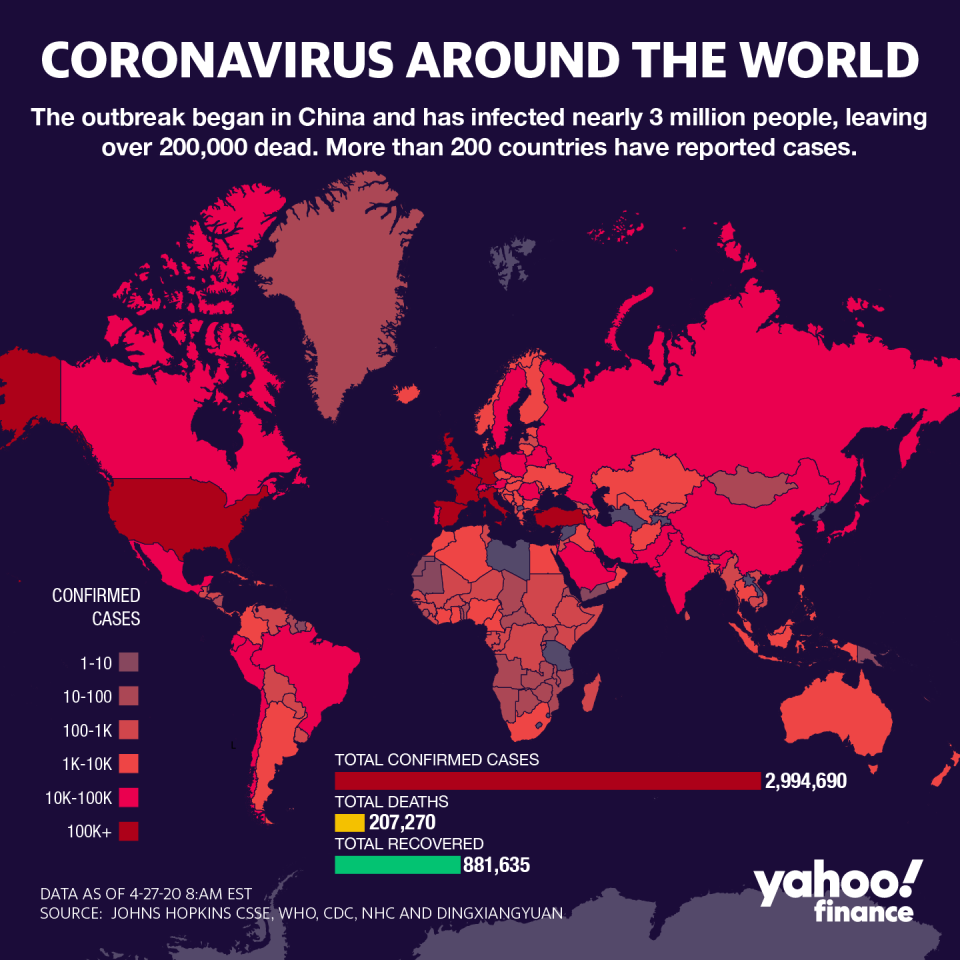Why China tolerates animal markets that produce deadly viruses
It seems like a no-brainer: Outlaw the live animal markets that propagate pathogens like the coronavirus, which has killed at least 208,000 people worldwide and roiled the global economy.
Yet despite global outrage, China’s markets are likely to keep selling bats, pangolins, civets, snakes, hawks, turtles and hundreds of other species, either legally or illicitly. While repulsive to many westerners, wildlife is a staple of both Chinese diets and Chinese medicine, with some traditions dating back centuries. Efforts to ban China’s wildlife trade would only push trafficking into gray or black markets, leaving the viral threat intact.
“It is striking that a country so good at control hasn’t been able to do a better job of this,” Orville Schell of the Asia Society tells Yahoo Finance. “As tightly controlled as China is, there are parts of its societal structure that are very decentralized. It’s very hard to control what goes on in the markets.”
Researchers think coronavirus and the Covid-19 disease it causes originated in a huge market in Wuhan, China, where vendors sold live and slaughtered wildlife along with processed meat, seafood, produce and other types of food. The highly contagious virus, which probably passed from bats to humans in Wuhan late last year, has been detected in 3 million people in dozens of countries, and there are probably millions of additional undetected cases. The virus linked with the SARS outbreak in 2003 also likely came from an animal market in China. HIV, Ebola and other viruses have probably come from animal markets elsewhere in the world.

U.S. and European officials have pressed China to shutter the markets. “It boggles my mind when we have so many diseases that emanate out of that unusual human-animal interface that we don’t just shut it down,” Dr. Anthony Fauci, the U.S. government’s top infectious disease expert, said in an April 3 interview. “I don’t know what else has to happen to get us to appreciate that.”
China’s central government banned some trade in wild animals earlier this year. Some provinces with powerful regional governments have enacted stricter bans. Yet China’s wild animal trade is likely to continue one way or another, because of strong demand for the products—just as demand for heroin or street opioids generates robust business here in the United States, even though it’s illegal.
“For the Covid pandemic to significantly decrease wildlife trafficking, it would have to reduce demand for wildlife products,” says Vanda Felbab-Brown of the Brookings Institution, author of the 2017 book “The Extinction Market,” about illegal poaching. “International pressure can play a role, but the other element is turning off 2 billion people from consuming wildlife products. A ban is insufficient unless you also mount a campaign to reduce demand.”
Wildlife consumption in China was a necessity after the Communist Party took power in 1949, and famine became routine. Reforms encouraged rural farmers to breed wild species such as rats, bats and cats, to amplify the food supply. Live-animal markets are now an important economic sector with money at stake and politicians who protect those interests, sometimes legally, sometimes for bribes. Outside of big cities like Beijing, Shanghai and Guangdong, regional officials looking out for local interests often have more power than central government figures.
Traditional Chinese medicine is another huge factor, since it relies on hundreds of ingredients that come from wildlife, such as pangolin scales, bear bile, bat feces and rhinoceros horns. While not necessarily effective, TCM remedies are popular, and the $73 billion industry is politically powerful. “The Chinese pharmaceutical industry is a big source of job and income generation,” Felbab-Brown says. “The government is loath to touch it.” China even persuaded the World Health Organization to include TCM in its global guide to illnesses and treatments, lending an air of legitimacy to practices that for hundreds or thousands of years have depended on the slaughter of wildlife. And the new limits China placed on wildlife trade earlier this year don’t apply to TCM.

Many countries besides China allow or tolerate the trafficking of wildlife, including Vietnam, Indonesia, Thailand, the Philippines, and some countries in Africa and Latin America. So even if China managed to rein in the wildlife trade, it would thrive elsewhere and probably even grow as Chinese demand went abroad.
After the SARS outbreak in 2003, China clamped down on parts of the animal trade likely responsible for the disease. But the crackdown didn’t last and most animal trade was back to normal in less than a year. Coronavirus is far more severe, with a death toll, so far, that’s 260 times worse. China’s economy has suffered as much as anybody’s, which means it’s in China’s interest to prevent another viral outbreak.
“This is a major wakeup call,” says Schell of the Asia Society. “I’m pretty sure it has gotten their attention this time. The party can do almost anything it wants—if it wants to.” Now would be a good time for some communist party resolve.
Rick Newman is the author of four books, including “Rebounders: How Winners Pivot from Setback to Success.” Follow him on Twitter: @rickjnewman. Confidential tip line: rickjnewman@yahoo.com. Encrypted communication available. Click here to get Rick’s stories by email.
Read more:
These 4 Republican states are ignoring Trump’s reopening guidelines
Get the latest financial and business news from Yahoo Finance
Follow Yahoo Finance on Twitter, Facebook, Instagram, Flipboard, SmartNews, LinkedIn, YouTube, and reddit.
